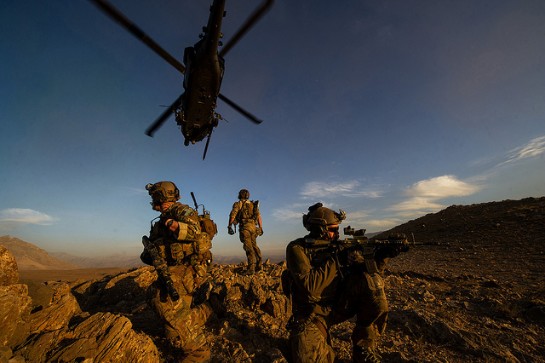 US Air Force
US Air Force
American Security Quarterly – August 2014
The Russian annexation of Crimea and the scores of pro-Russia militants taking up arms in Eastern Ukraine — before it physically happened, you would be hard-pressed to find someone who labeled it a likelihood.
This example of a ‘black swan event’ is far from the only one that we have seen recently. The fact of the matter is that events small and large, but equally unexpected, have sprung up at an alarming rate around the globe. Political pundits and decision-makers will continue to rank the importance of such events, devise increasingly complex political solutions to deal with individual situations, and feed political campaigns from the missteps of their colleagues on the other side of the aisle.
Perhaps you would not be surprised to hear that I believe these sorts of behavior to be largely counterproductive to our long-term national security and standing within the international community. Although we cannot forget the importance of quick and precise decision-making in order to deal with crises as they appear, these crises also have the opportunity to give us a ‘forest through the trees moment’ – we can either continue to respond to black swan events as they appear, or look towards their root causes in this rapidly developing century.
At the American Security Project, we’ve examined some of those root causes over the past few months. An excellent example of this fact is our work in public diplomacy. By recognizing that a country simply cannot refuse to give its people a voice (at least in the long-term), one can gain a clearer view on how a place like the United States should interact with allies and enemies alike. To this end, we have discussed innovative State Department cultural diplomacy initiatives with members of Next Level who travel the world, bridging regional music with American hip-hop; the intricate and changing views of Arab youth with leaders of Burson-Marsteller and Penn Schoen Berland; and how internet censorship and circumvention are used around the world.
These projects do not only give us insight on public diplomacy, but also matters related to national security, asymmetric operations, and even economic security. It is exactly the type of thinking necessary to deal with increasingly complex issues that not only cross disciplines, but also cultures, languages, and currencies.
These issues are only exacerbated by larger factors that plague our world. All one has to do is look towards our work in climate change and national security. ASP’s distinguished cadre of retired flag officers have repeatedly gone around the country in order to explain to average citizens and decision-makers alike that climate change acts as a “threat multiplier” and “accelerant of instability.” Although these issues may most blatantly affect developing nations, their effects reverberate in places like the United States. It simply isn’t enough to say that we must allow these countries to deal with climate issues on their own – it has and will continue to have effects at home.
Lastly, I would be remiss if I didn’t say that wholly national security issues are also changing. Just as we are seeing a rise in the voice of the common citizen, we are also seeing new, social-media based communications from non-state actors and major powers alike. If we as a nation do not recognize and work towards adapting policy to these developments, we cannot effectively secure our country and remain a relevant force internationally.
Our world becomes more uncertain each and every day. Whereas we could once determine foreign policy based on the actions of a handful of nations, we must now consider the increasingly important role of the foreign public, non-state actors, and even our own climate. All these factors combine to create an international community where the next crisis could result in a 180° turn from the norm. In this issue of American Security Quarterly, we hope to give you a broad view of the relationship between the various elements that must be understood when making key policy decisions – I hope that you’ll agree.
Sincerely,
Adin Dobkin
Government & Media Affairs Officer | Adjunct Junior Fellow
American Security Quarterly – August 2014 by The American Security Project







[…] American Security Quarterly – August 2014 […]